By InvestMacro
The latest update for the weekly Commitment of Traders (COT) report was released by the Commodity Futures Trading Commission (CFTC) on Friday for data ending on May 30th.
This weekly Extreme Positions report highlights the Most Bullish and Most Bearish Positions for the speculator category. Extreme positioning in these markets can foreshadow strong moves in the underlying market.
To signify an extreme position, we use the Strength Index (also known as the COT Index) of each instrument, a common method of measuring COT data. The Strength Index is simply a comparison of current trader positions against the range of positions over the previous 3 years. We use over 80 percent as extremely bullish and under 20 percent as extremely bearish. (Compare Strength Index scores across all markets in the data table or cot leaders table)
Here Are This Week’s Most Bullish Speculator Positions:
Bloomberg Commodity Index
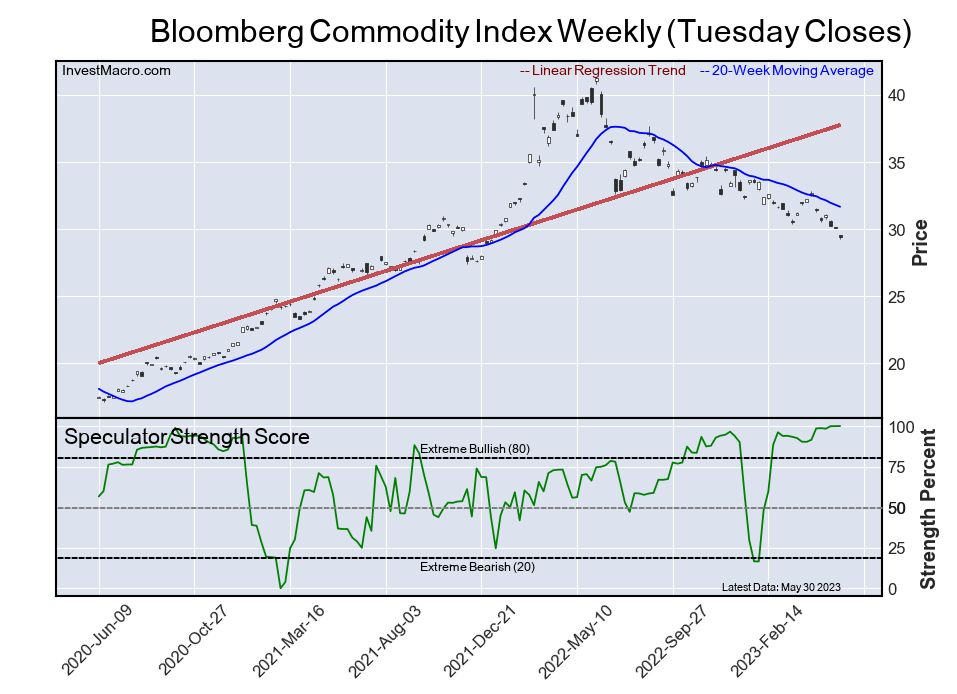
The Bloomberg Commodity Index speculator position comes in as the most bullish extreme standing this week. The Bloomberg Commodity Index speculator level is currently at a 100.0 percent score of its 3-year range.
The six-week trend for the percent strength score totaled 8.5 this week. The overall net speculator position was a total of -1,668 net contracts this week with a change of 9 contracts in the weekly speculator bets.
Free Reports:
 Sign Up for Our Stock Market Newsletter – Get updated on News, Charts & Rankings of Public Companies when you join our Stocks Newsletter
Sign Up for Our Stock Market Newsletter – Get updated on News, Charts & Rankings of Public Companies when you join our Stocks Newsletter
 Get our Weekly Commitment of Traders Reports - See where the biggest traders (Hedge Funds and Commercial Hedgers) are positioned in the futures markets on a weekly basis.
Get our Weekly Commitment of Traders Reports - See where the biggest traders (Hedge Funds and Commercial Hedgers) are positioned in the futures markets on a weekly basis.
Cocoa Futures
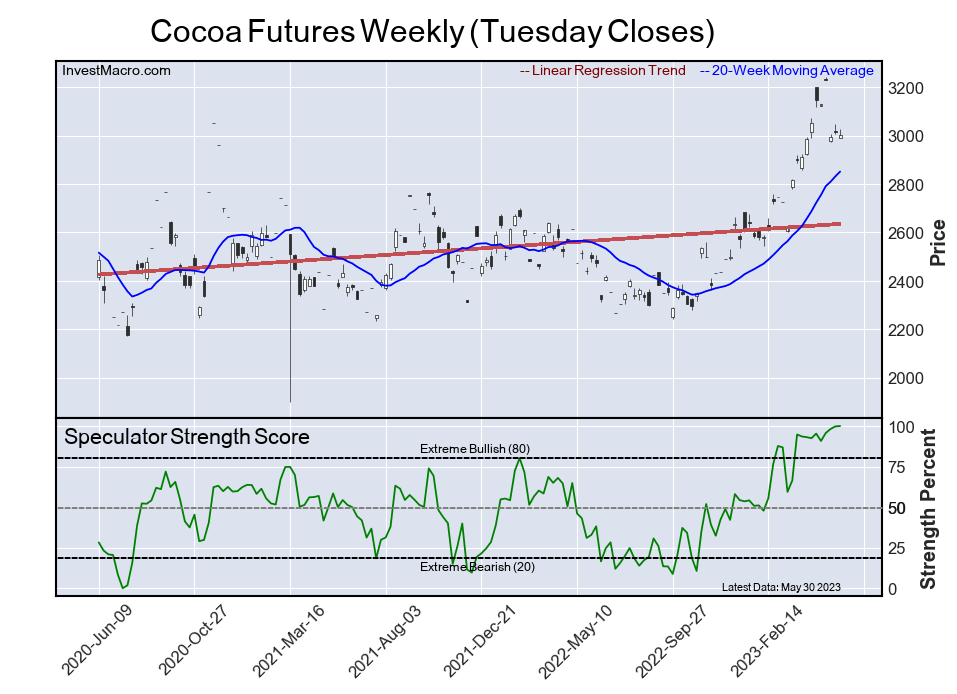
The Cocoa Futures speculator position comes next in the extreme standings this week. The Cocoa Futures speculator level is now at a 100.0 percent score of its 3-year range.
The six-week trend for the percent strength score was 7.5 this week. The speculator position registered 65,573 net contracts this week with a weekly edge higher of 199 contracts in speculator bets.
Mexican Peso
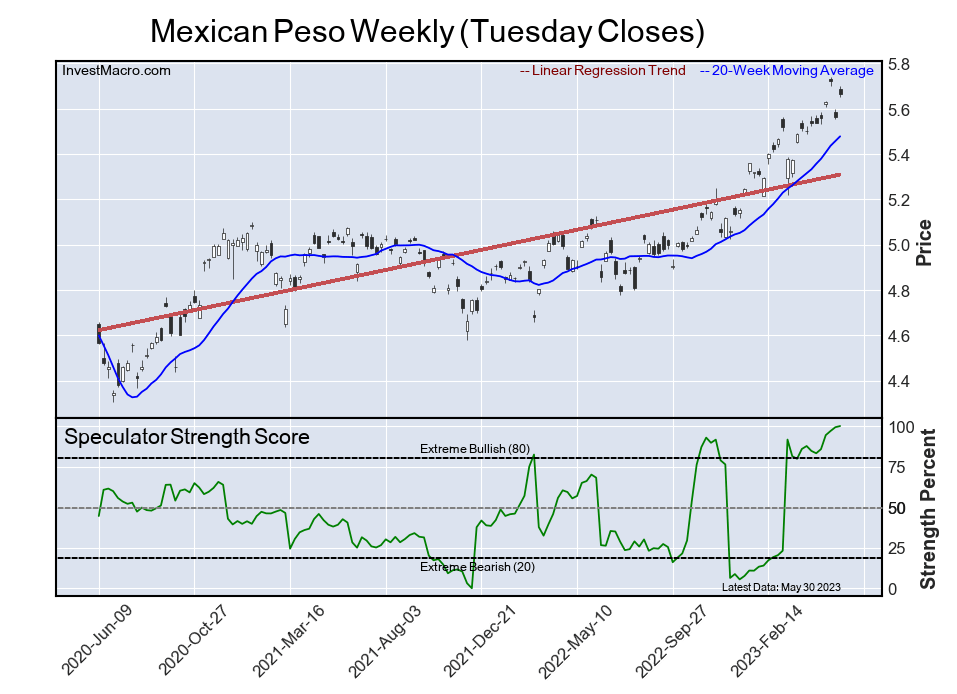
The Mexican Peso speculator position comes in third this week in the extreme standings. The Mexican Peso speculator level resides at a 100.0 percent score of its 3-year range.
The six-week trend for the speculator strength score came in at 15.4 this week. The overall speculator position was 78,005 net contracts this week with a rise of 1,062 contracts in the weekly speculator bets.
3-Month Secured Overnight Financing Rate
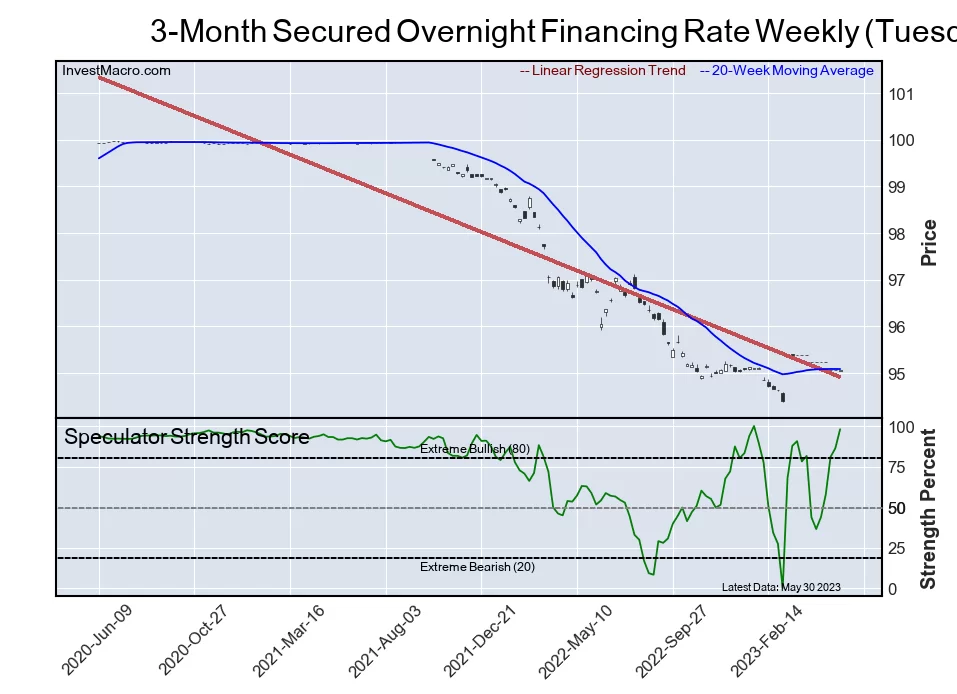
The 3-Month Secured Overnight Financing Rate speculator position comes up number four in the extreme standings this week. The 3-Month Secured Overnight Financing Rate speculator level is at a 98.0 percent score of its 3-year range.
The six-week trend for the speculator strength score totaled a change of 54.2 this week. The overall speculator position was 43,222 net contracts this week with a jump of 144,765 contracts in the speculator bets.
Live Cattle
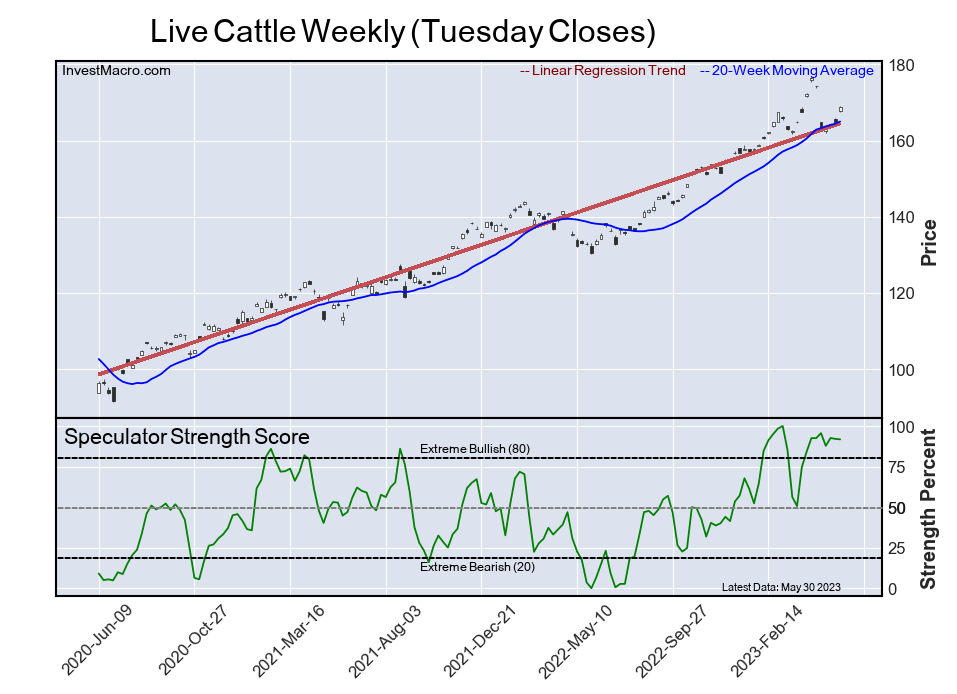
The Live Cattle speculator position rounds out the top five in this week’s bullish extreme standings. The Live Cattle speculator level sits at a 91.8 percent score of its 3-year range. The six-week trend for the speculator strength score was -0.8 this week.
The speculator position was 101,378 net contracts this week with a small decline of -269 contracts in the weekly speculator bets.
This Week’s Most Bearish Speculator Positions:
Lean Hogs
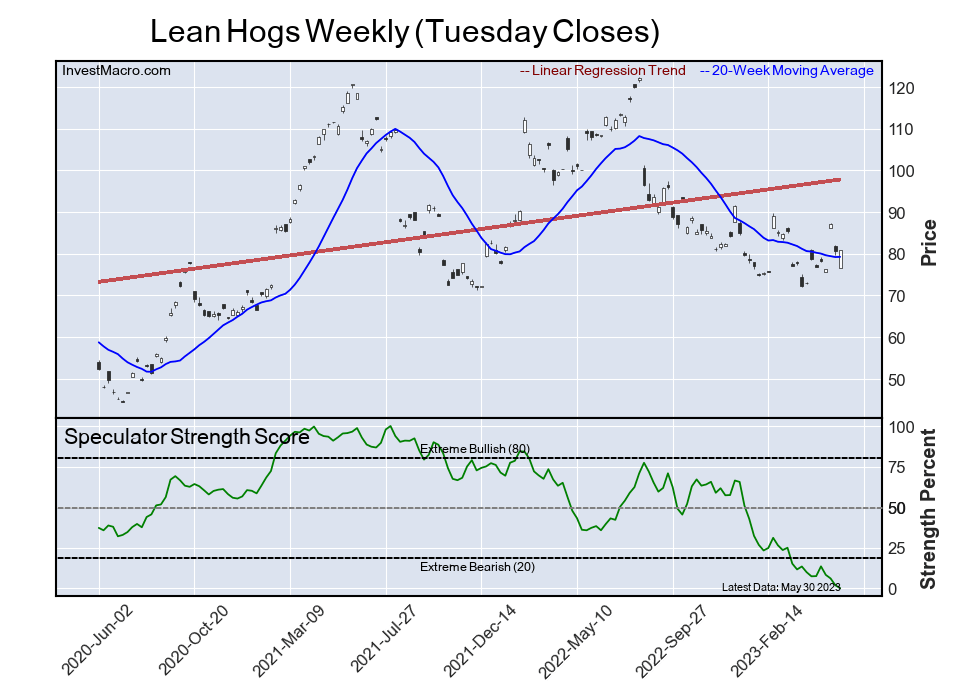
The Lean Hogs speculator position comes in as the most bearish extreme standing this week. The Lean Hogs speculator level is at a 0.0 percent score of its 3-year range.
The six-week trend for the speculator strength score was -7.4 this week. The overall speculator position was -36,114 net contracts this week with a dip of -2,262 contracts in the speculator bets.
Soybean Oil
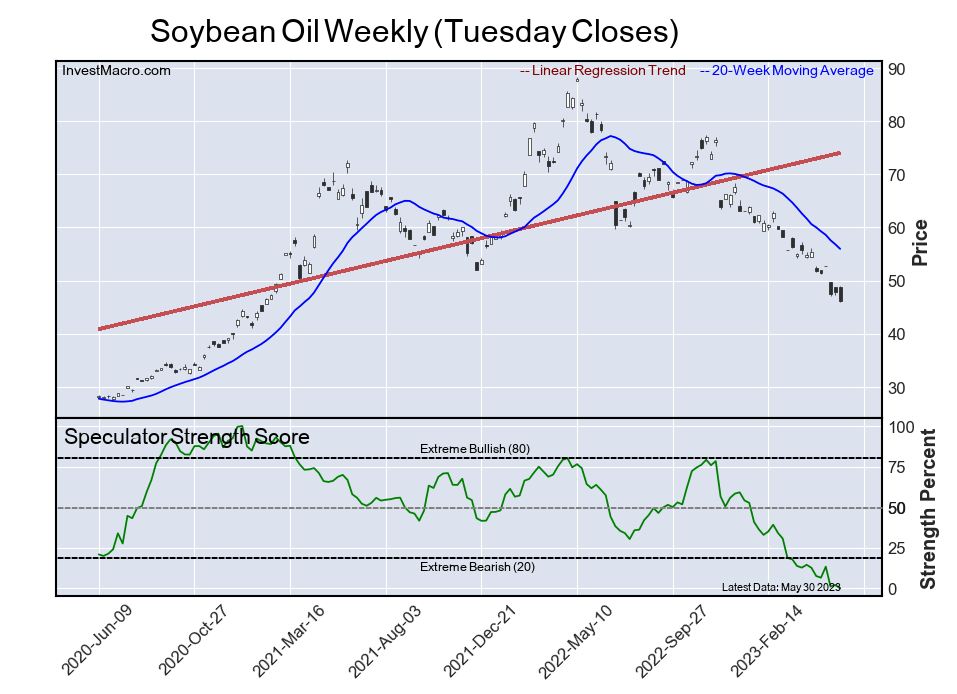
The Soybean Oil speculator position comes in next for the most bearish extreme standing on the week. The Soybean Oil speculator level is at a 0.0 percent score of its 3-year range.
The six-week trend for the speculator strength score was -12.6 this week. The speculator position was -31,248 net contracts this week with a shortfall of -3,385 contracts in the weekly speculator bets.
Wheat
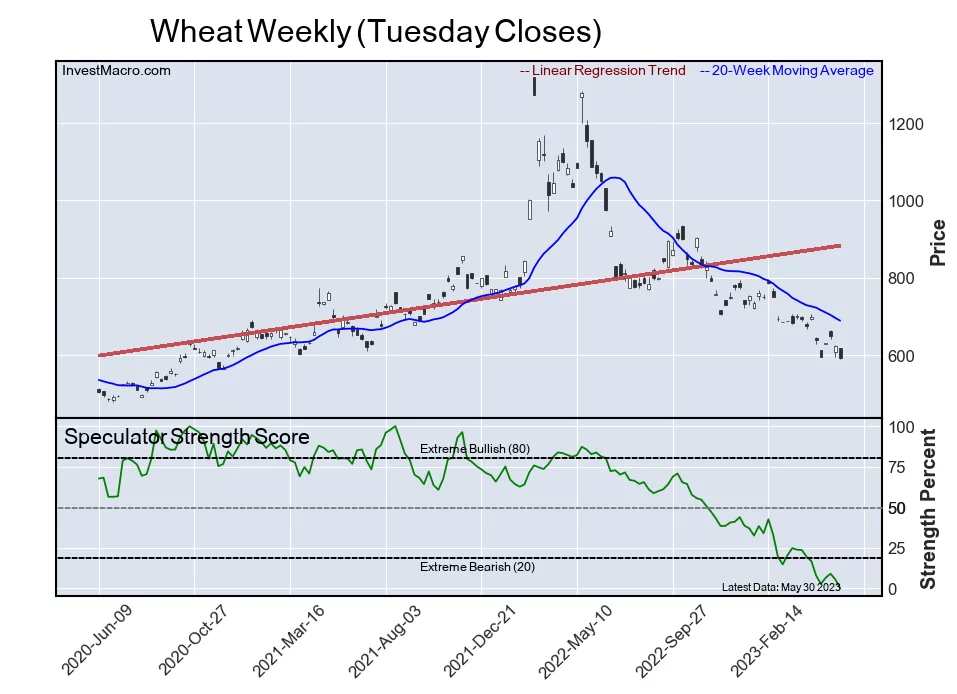
The Wheat speculator position comes in as third most bearish extreme standing of the week. The Wheat speculator level resides at a 0.0 percent score of its 3-year range.
The six-week trend for the speculator strength score was -16.7 this week. The overall speculator position was -93,996 net contracts this week with a decline of -7,677 contracts in the speculator bets.
Brent Oil
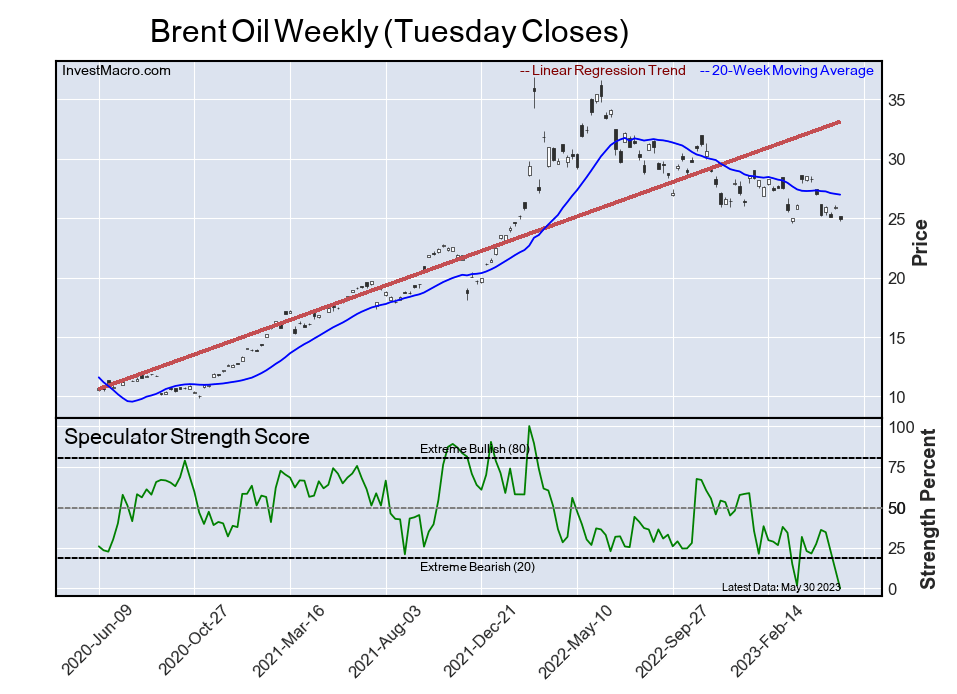
The Brent Oil speculator position comes in as this week’s fourth most bearish extreme standing. The Brent Oil speculator level is at a 0.0 percent score of its 3-year range.
The six-week trend for the speculator strength score was -21.4 this week. The speculator position was -53,294 net contracts this week with a drop of -5,488 contracts in the weekly speculator bets.
10-Year Note
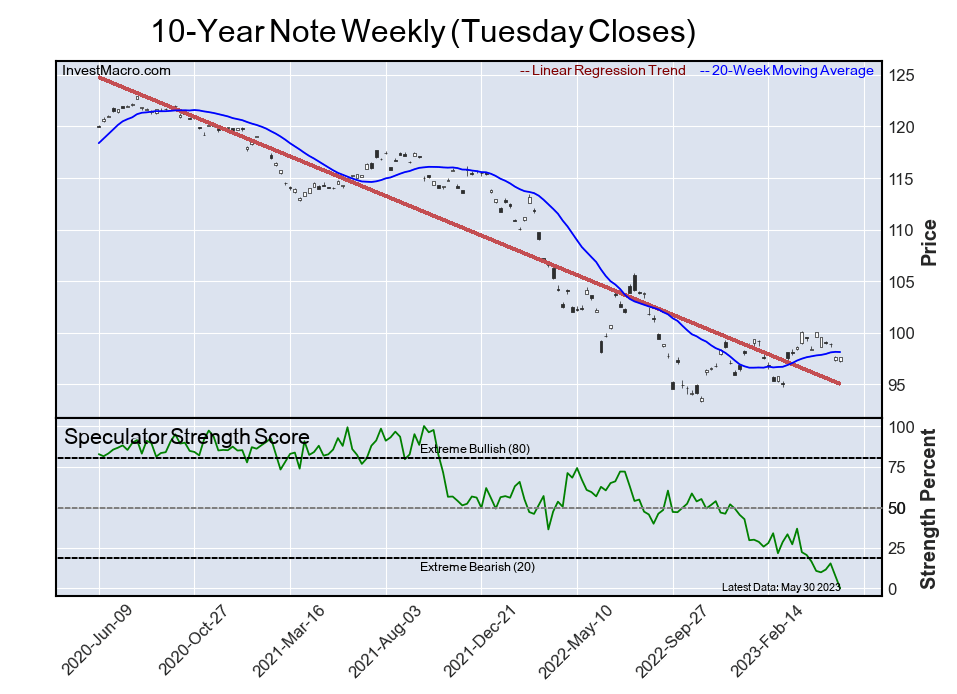
Finally, the 10-Year Note speculator position comes in as the fifth most bearish extreme standing for this week. The 10-Year Note speculator level is at a 0.0 percent score of its 3-year range.
The six-week trend for the speculator strength score was -16.5 this week. The speculator position was -850,421 net contracts this week with a decrease of -78,783 contracts in the weekly speculator bets.
Article By InvestMacro – Receive our weekly COT Newsletter
Speculators or Non-Commercials Notes:
Speculators, classified as non-commercial traders by the CFTC, are made up of large commodity funds, hedge funds and other significant for-profit participants. The Specs are generally regarded as trend-followers in their behavior towards price action – net speculator bets and prices tend to go in the same directions. These traders often look to buy when prices are rising and sell when prices are falling. To illustrate this point, many times speculator contracts can be found at their most extremes (bullish or bearish) when prices are also close to their highest or lowest levels.
These extreme levels can be dangerous for the large speculators as the trade is most crowded, there is less trading ammunition still sitting on the sidelines to push the trend further and prices have moved a significant distance. When the trend becomes exhausted, some speculators take profits while others look to also exit positions when prices fail to continue in the same direction. This process usually plays out over many months to years and can ultimately create a reverse effect where prices start to fall and speculators start a process of selling when prices are falling.
*COT Report: The COT data, released weekly to the public each Friday, is updated through the most recent Tuesday (data is 3 days old) and shows a quick view of how large speculators or non-commercials (for-profit traders) were positioned in the futures markets.
The CFTC categorizes trader positions according to commercial hedgers (traders who use futures contracts for hedging as part of the business), non-commercials (large traders who speculate to realize trading profits) and nonreportable traders (usually small traders/speculators) as well as their open interest (contracts open in the market at time of reporting). See CFTC criteria here.

- Most of the tariffs imposed by the Trump administration take effect today Apr 2, 2025
- EUR/USD Declines as Markets Await Signals of a Renewed Trade War Apr 2, 2025
- “Liberation Day”: How markets might react to Trump’s April 2nd tariff announcement? Apr 2, 2025
- The RBA expectedly kept interest rates unchanged. Oil rose to a one-month high Apr 1, 2025
- World stock indices sell off under the weight of new tariffs Mar 31, 2025
- COT Metals Charts: Speculator Bets led by Copper & Palladium Mar 30, 2025
- COT Bonds Charts: Speculator Bets led by 10-Year Bonds, Fed Funds & 2-Year Bonds Mar 30, 2025
- COT Soft Commodities Charts: Speculator Bets led by Sugar & Live Cattle Mar 30, 2025
- COT Stock Market Charts: Weekly Speculator Bets led this week by Nikkei 225 Mar 30, 2025
- It Looks Like Its a Good Time To Buy This Gold Stock Mar 28, 2025